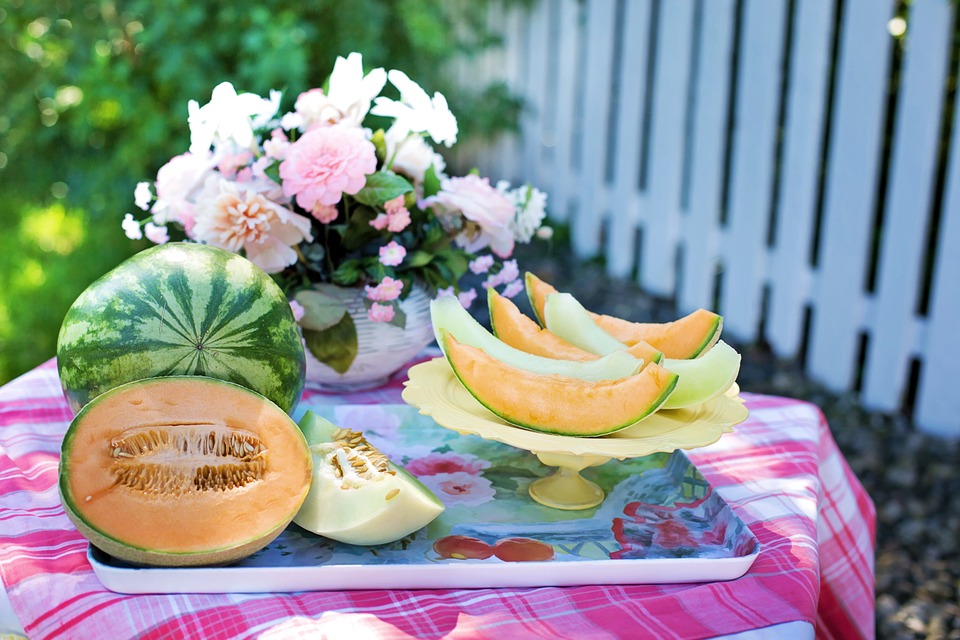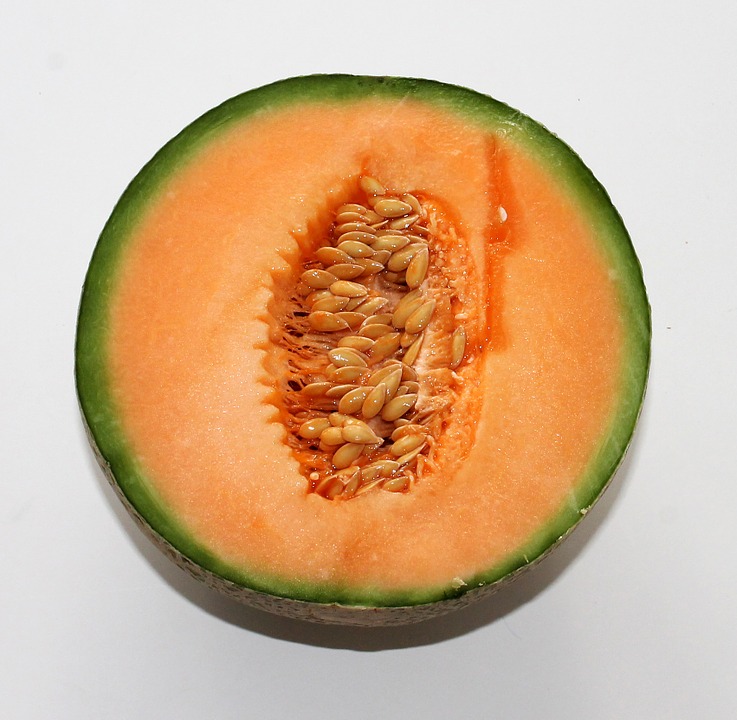This comprehensive guide delves into the world of rabbit nutrition, exploring whether cantaloupe is a safe treat for your furry friend. We'll go beyond the basics to provide a detailed list of other fruits that are suitable for rabbits, along with tips on how to introduce new foods and ensure your bunny enjoys a healthy and balanced diet. We'll also address common concerns and provide clear, informative answers to frequently asked questions about feeding your rabbit.
Part 1: Unveiling the Truth About Cantaloupe and Rabbits

1.1. Cantaloupe: A Nutritious Treat for Humans, Not Bunnies
Cantaloupe, with its vibrant colour and sweet aroma, is a favourite summer fruit for humans. It's packed with essential vitamins, minerals, and antioxidants. However, this nutritional profile, while beneficial for us, is problematic for rabbits.
1.2. The Sugar Trap: Why Cantaloupe is a No-No for Bunnies
Rabbits are delicate creatures with a sensitive digestive system. Their bodies aren't designed to process the high sugar content found in cantaloupe. Excess sugar can wreak havoc on their gut, leading to:
Digestive Issues: Cantaloupe's high sugar content can cause diarrhoea, gas, and bloating.
Dental Problems: Sugar contributes to the growth of bacteria in the mouth, increasing the risk of dental problems like overgrown teeth.
Obesity: Excessive sugar intake can lead to weight gain, increasing the risk of health problems like heart disease and arthritis.
1.3. Is it Just the Sugar? Other Reasons to Avoid Cantaloupe
Beyond the sugar content, cantaloupe's high water content can also be problematic for rabbits. This can:
Cause Digestive Upset: The sudden influx of water can overwhelm a rabbit's delicate digestive system.
Lead to Dehydration: While it seems counterintuitive, the high water content can actually dehydrate rabbits as their bodies work to process it.
1.4. Understanding Your Rabbit's Nutritional Needs
To keep your rabbit healthy and happy, it's crucial to understand their dietary needs. Rabbits are herbivores, designed to thrive on a diet rich in fibre. This means:
Hay is King: High-quality hay, such as Timothy hay, should make up the bulk of their diet, providing essential fibre for healthy digestion and teeth wear.
Vegetables are Important: A variety of fresh, leafy green vegetables should supplement their hay diet, offering essential vitamins and minerals.
Fruits are Treats, Not Staples: Fruits should be offered sparingly, in small quantities, and only as occasional treats.
Part 2: A Guide to Safe Fruits for Rabbits

While cantaloupe is off the menu, there are plenty of fruits that rabbits can enjoy in moderation, offering them a little extra sweetness and flavour in their diet. Here's a breakdown of safe fruits, along with tips on how to offer them safely:
2.1. Berries: Tiny Powerhouses of Nutrition
Berries are a great source of vitamins, antioxidants, and fibre, making them a safe and delicious treat for rabbits:
Strawberries: These delightful berries are packed with vitamin C, offering a boost to your rabbit's immune system.
Blueberries: Rich in antioxidants and fibre, blueberries provide a healthy dose of flavour and nutrition.
Raspberries: These juicy gems are also excellent sources of vitamin C and fibre, adding variety to your rabbit's treat repertoire.
Tips for Offering Berries:
Wash Thoroughly: Always wash berries thoroughly to remove any dirt or pesticides.
Remove Seeds: Some berries, like strawberries, have small seeds that can be a choking hazard. Remove these seeds before offering berries to your rabbit.
Start Small: Introduce new berries gradually, offering just a small piece initially to see how your rabbit reacts.
2.2. Citrus Fruits: A Sour Surprise for Rabbits
Citrus fruits, while a common staple in human diets, should be offered to rabbits with caution due to their high sugar content. If you choose to offer citrus, focus on the rind:
Oranges: The peeled rind of an orange, free of seeds and white pith, can be offered in small quantities.
Grapefruit: Similar to oranges, grapefruit rind, peeled and seedless, is a safe option in small quantities.
Lemons: The peeled rind of a lemon can be offered as an occasional treat, but only in small quantities.
Tips for Offering Citrus Fruits:
Peel Thoroughly: Always remove the pith (the white layer) from citrus fruits, as it can be bitter and potentially upsetting to your rabbit's digestive system.
Avoid Seeds: Seeds can be a choking hazard and should always be removed.
Limited Intake: Offer citrus fruits only in moderation and ensure they are not a staple of your rabbit's diet.
2.3. Apples & Pears: A Crisp & Juicy Treat
Apples and pears, while tempting to rabbits, require careful preparation to be safe:
Apples: Apples are a good source of fibre and vitamin C, but the seeds and core should be removed. Peel the apple, especially for young rabbits, as the skin can be difficult to digest.
Pears: Similar to apples, pears should be peeled, removing the core and seeds before offering to your rabbit.
Tips for Offering Apples and Pears:
Choose Organic Options: Whenever possible, opt for organic apples and pears to avoid exposing your rabbit to pesticides.
Remove Seeds and Core: Seeds and the core contain cyanide, which is toxic to rabbits.
Fresh is Best: Offer fresh apples and pears, avoiding overripe fruit, which can be too sugary and acidic for rabbits.
2.4. Bananas: A Source of Potassium, But Use With Caution
Bananas, with their high potassium content, can be a tempting treat for rabbits. However, their high sugar content makes them a risky choice:
Offer in Small Quantities: Only offer a small piece of banana as an occasional treat, and ensure it is peeled and free from any skin.
Watch for Digestive Issues: Monitor your rabbit closely for signs of digestive upset after offering banana, and if you see any issues, stop offering it immediately.
Part 3: Introducing New Fruits to Your Rabbit: A Gentle Approach
Introducing new fruits to your rabbit's diet requires a gentle approach to avoid digestive upset:
3.1. Start Small and Observe
Small Bite, Big Impact: Offer a tiny piece of the new fruit, no larger than a pea, and closely observe your rabbit's reaction.
Monitor for Signs of Trouble: Watch for signs of digestive distress, such as diarrhoea, gas, bloating, or changes in behaviour.
Stop If You See Issues: If you notice any signs of discomfort, discontinue offering the fruit immediately.
3.2. Gradual Increase
If your rabbit tolerates the new fruit well, you can gradually increase the amount you offer over several days.
Small Increments: Increase the quantity gradually, adding a tiny bit more each day.
Observe Continuously: Continue to monitor your rabbit for any signs of digestive issues.
3.3. Consistency is Key
Once your rabbit has adjusted to the new fruit, continue offering it in small quantities as an occasional treat.
Avoid Overfeeding: Always remember that fruits should only be a small part of your rabbit's diet.
Part 4: Beyond Fruit: The Importance of a Balanced Diet for Your Rabbit
While fruits can add a little sweetness and variety to your rabbit's diet, it's essential to prioritize a balanced diet:
4.1. Hay: The Cornerstone of a Healthy Rabbit Diet
High-Quality Hay: Timothy hay, with its high fibre content and low sugar content, should be the cornerstone of your rabbit's diet.
Unlimited Access: Provide unlimited hay, ensuring there is always a fresh supply available.
Hay Types: Timothy hay, oat hay, and orchard grass hay are all excellent choices.
4.2. Fresh Vegetables: A Daily Delight
Variety is Key: Offer a variety of leafy green vegetables daily, ensuring they are washed and free of pesticides.
Safe Options: Excellent choices include kale, spinach, romaine lettuce, parsley, cilantro, bell peppers, and broccoli.
Introduce Gradually: As with fruits, introduce new vegetables gradually, observing for any signs of digestive upset.
4.3. Water: Essential for Hydration
Fresh Water Always: Ensure your rabbit has access to fresh, clean water at all times.
Ceramic or Stainless Steel Bowls: Use ceramic or stainless steel bowls for water, as plastic bowls can harbour bacteria.
Change Water Regularly: Change the water daily to keep it clean and fresh.
4.4. Treats: A Special Indulgence
Occasional Delights: Offer treats sparingly, ensuring they are healthy and appropriate for rabbits.
Healthy Options: Good treat options include small amounts of fresh herbs, a few pellets of high-quality rabbit food, or a tiny piece of safe fruit.
No Sugar Added: Avoid sugary treats, including commercial rabbit treats, as they are high in sugar and can contribute to dental and digestive problems.
Part 5: Frequently Asked Questions (FAQs)
5.1. Can I Give My Rabbit Cantaloupe Rind?
No, even the rind of cantaloupe is high in sugar and can be harmful to rabbits. Stick to safe and appropriate fruit options.
5.2. What Other Foods are Toxic to Rabbits?
Many common foods are toxic to rabbits, including chocolate, onions, garlic, avocado, alcohol, and many others. Always research the safety of any new food before offering it to your rabbit.
5.3. How Often Can I Give My Rabbit Fruit?
A small piece of fruit can be offered a few times a week as a treat, but it's essential to ensure it doesn't replace their regular hay and vegetable intake.
5.4. What are the Signs of an Overweight Rabbit?
Overweight rabbits may have a pot-belly, difficulty moving, and lethargy. If you're concerned about your rabbit's weight, consult with your vet.
5.5. How Can I Ensure My Rabbit Stays Hydrated?
Rabbits need access to fresh, clean water at all times. Provide a ceramic or stainless steel bowl with fresh water and change it regularly.
5.6. Is it Safe to Feed My Rabbit Dried Fruit?
Dried fruits are high in sugar and can be harmful to rabbits. It's best to avoid dried fruits and stick to fresh, whole fruits in moderation.
5.7. Can I Give My Rabbit Dried Herbs?
Dried herbs can be a safe treat for rabbits, but it's important to choose herbs that are safe for them. Avoid herbs like oregano, thyme, and rosemary, as they can be toxic. Safe herbs include parsley, cilantro, and dill. Always offer dried herbs in moderation, and ensure they are fresh and free of pesticides.
5.8. My Rabbit Doesn't Seem to Like Vegetables, What Can I Do?
Many rabbits can be picky eaters, but with patience and persistence, you can encourage them to try new vegetables. Start by offering small, bite-sized pieces of vegetables alongside their favourite foods. Slowly introduce new vegetables, mixing them with familiar ones. Avoid forcing your rabbit to eat vegetables, as this can create negative associations.
5.9. My Rabbit's Teeth Seem to Be Growing Long. Is This Normal?
Rabbits' teeth continuously grow throughout their lives. They wear down their teeth naturally by chewing on hay and other fibrous foods. If your rabbit's teeth are not wearing down properly, they can become overgrown, leading to pain, difficulty eating, and other health problems. If you suspect your rabbit has overgrown teeth, consult with a veterinarian.
Remember, a healthy diet is the foundation of a happy and long life for your rabbit. By offering a balanced diet rich in hay, fresh vegetables, and occasional safe fruit treats, you can ensure your furry friend stays healthy and thrives.
Everyone is watching
-

Do Rabbits Lay Eggs? (The Surprising Truth)
OTHER TYPES OF PETSThis article will unravel the common misconception that rabbits lay eggs, exploring the fascinating world of r...
-

Can Rabbits Eat Grapes? A Guide to Safe Rabbit Treats
OTHER TYPES OF PETSThis comprehensive guide will explore the safety and suitability of grapes for rabbits, providing detailed inf...
-

What's a Group of Rabbits Called? (A Comprehensive Guide)
OTHER TYPES OF PETSThis article delves into the fascinating world of rabbits, exploring the various terms used to describe a grou...
-

Predators That Hunt Rabbits: A Guide to Natural Enemies
OTHER TYPES OF PETSI've always been fascinated by the circle of life, that delicate dance between predator and prey. Growing up ...
-

Are Rabbits Nocturnal Animals?
OTHER TYPES OF PETSThe question of whether rabbits are nocturnal animals is a fascinating one, with a surprisingly complex answer...
